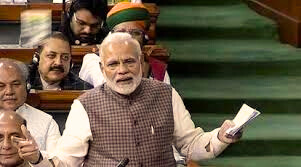
‘One Nation, One Election Bill’ has approved in The Union Cabinet, The bill to hold simultaneous elections has sparked a debate. Supporters argue that it increases the efficiency of the country, while opponents say it threatens regional (state) representation and federalism.
The Union Cabinet led by Prime Minister Narendra Modi has approved the ‘One Nation, One Election’ Bill to be introduced in the current session of Parliament.
Today’s ‘approval’, as one political analyst said on LinkedIn, comes in the middle of the ongoing winter session of Parliament. According to information, the Modi government wants to introduce this bill in the winter session of Parliament, after which it will be sent to the Parliament.

What is 'One Nation, One Election'?
If implemented, Lok Sabha, assembly and local body (urban or rural) elections will be held in the same year, if not at the same time.
The high-level panel headed by former President Ram Nath Kovind submitted the report in March before the announcement of the 2024 Lok Sabha elections, the planning committee had said in the report that the plan could ‘change the electoral process’.
If the bill is passed, the first step is to hold Lok Sabha and assembly elections simultaneously. The planning committee has recommended that local body (urban or rural) elections will be held within 100 days. The planning committee has also suggested measures in case of premature dissolution of the assembly or even the Lok Sabha, defection or hung assembly.
Modi’s Cabinet has approved the planning committee report and the proposed bill, as reported on Thursday, so the Centre will now introduce the bill in the winter session of Parliament.
Two Bills – one dealing with Lok Sabha and Assembly elections and the other dealing with urban and rural elections – need to be passed by Parliament.
The 2024 Kovind panel had recommended amendments to the Constitution to hold simultaneous elections in two phases: Elections to the Lok Sabha and state assemblies will be held simultaneously. Urban and rural elections will be held along with the Lok Sabha and state assemblies in such a way that municipal and panchayat elections are held within 100 days of the Lok Sabha and Assembly elections.
The panel has also recommended amendments to the Constitution to enable the Election Commission of India to prepare a single voter list and EPIC in consultation with state election commissions. These amendments will require ratification by at least half of the states.
At least five articles of the Constitution should be amended to ensure the ‘one nation, one election’ scheme
Ruling Party say’s
The BJP has been demanding simultaneous elections since it came to power in 2014. Simultaneous elections were included in the BJP’s 2014 and 2019 election manifestos. The BJP’s 2014 manifesto read, “The BJP will try to develop a method of holding simultaneous assembly and Lok Sabha elections in consultation with other parties. This will ensure some stability for state governments besides reducing election expenditure for both political parties and the government.” The Niti Aayog supported the proposal in 2017 and the next year, then President Ram Nath Kovind mentioned it in his address to a joint session of Parliament. In August 2018, the Law Commission released a draft report examining the legal-constitutional aspects. In his Independence Day speech in 2019, Prime Minister Narendra Modi reiterated the need for simultaneous elections.
The Commission says that there are many benefits of conducting one nation one election. The argument in favour of conducting simultaneous elections is that it will provide ease and convenience to voters, avoid voter fatigue and lead to greater participation in voting. Also, conducting simultaneous elections of all three levels of government will avoid disruptions in supply chains and production cycles due to migrant workers seeking leave to vote and reduce the financial burden on the government treasury. Its supporters say that conducting frequent elections puts a burden on the government treasury. Frequent use of government officials and security forces adversely affects the discharge of their duties and frequent imposition of the Model Code of Conduct (MCC) leads to policy paralysis and slows down the pace of development programmes.
Apposition Party Say’s
The opposition has said, “It is impractical and cruel.” The proposal cannot be implemented due to opposition from opposition parties. The Congress party has described the bill as ‘against democracy and the basic structure of the Constitution’. On December 12, Aam Aadmi Party (AAP) chief Arvind Kejriwal opposed the bill. Kejriwal said in a post on Instagram, “The country needs one nation, one education, one nation, one healthcare system, not one nation, one election. The BJP has wrong priorities.”
Tamil Nadu Chief Minister MK Stalin also opposed the proposal, calling it ‘draconian’ and ‘anti-democratic’.
“The Union Cabinet has approved the introduction of the ‘One Nation, One Election Bill’ in Parliament. This impractical and anti-democratic move will wipe out regional voices, destroy federalism and hamper governance. Wake up India! Let us protect Indian democracy with all our might,” Stalin said.
The opposition says that this proposal will end regional parties. They also say that this will lead to uniformity in political discourse and it will become difficult for small parties and states to present their views before the country.